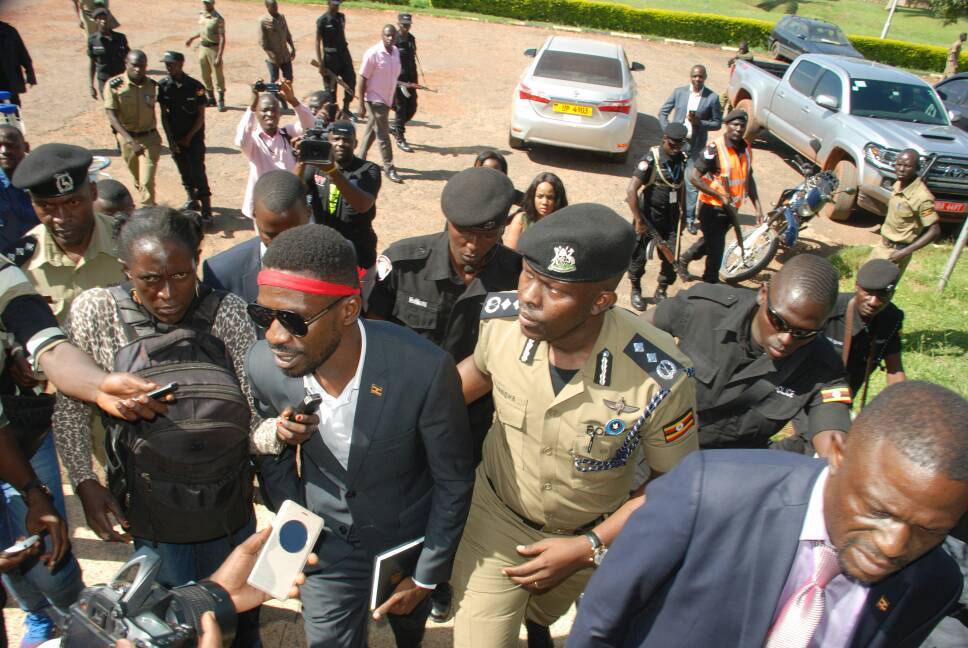By: Daniel McElroy
Rising political tensions in Uganda over the past several weeks have come to a fever pitch on the back of newly elected Member of Parliament Robert Kyagulanyi, better known by his stage name Bobi Wine. In the span of less than a month, Wine has found himself detained at Kampala’s international airport, insulted by the president, and the victim of a grenade attack on his family’s home—all seemingly because of his opposition to a constitutional amendment that would lift the country’s current presidential age limit.
Elected last June to represent Uganda’s Kyadondo East region, Wine left a successful singing career to run for office, building upon his already long-standing record as an activist and advocate for Uganda’s poor urban youth (from which he comes himself). During the high-profile election campaign, Wine spent time going door-to-door in his constituency, and beat two other political veterans in a landslide win.
While Wine’s election seemed to mark a victory for young Ugandan voters eager for change in a country that has spent decades struggling to eradicate deep-seated political corruption, his decision to speak against this very problem has placed him in political and personal danger.
Shortly before Wine left for a trip to New York in September, media outlets (both in Uganda and abroad) began quoting a Whatsapp audio message recorded by Wine in which he spoke harshly against a parliamentary proposal to remove a requirement stipulating that presidents must step down at age 75. Uganda’s current president, Yoweri Museveni, is 73 and has been in power since 1986.
Wine’s statement argued that legislators ought to be working to find solutions to the country’s most troubling problems—which include rising maternal mortality rates, high homicide rates, and poor infrastructure—rather than amending the constitution to benefit the president, whom Wine has separately denounced publicly on multiple occasions. “You are traitors. You have sold your conscience,” he added. “You should remember that it is your children and your children’s children who will have to inherit this mess you are creating.”
When Wine attempted to return to Uganda on September 22, he was shortly detained at Entebbe International Airport. While Wine’s supporters gathered outside to welcome him home, Kampala Metropolitan Police were ordered to block his vehicle and Wine was forced to proceed to Entebbe Police Station to “make a statement” with regard to his earlier Whatsapp comments. He was soon released, though President Museveni himself commented publicly that Wine is either “uninformed or a liar” based on his allegations that lifting the presidential age limit would compound Uganda’s current corruption problems.
Continued threats to Wine’s safety have been increasingly personal and fear-inducing. Just four days after his detention at the airport, Wine was informed of a plan for police to detain him again while en route from his home to the Parliament. Attempting to evade capture, Wine travelled via an alternate route after having spent the night away from his home, only to find that he was indeed followed by police anyway. After a dramatic chase through the streets of Kampala, Wine’s vehicle was stopped in a traffic jam, at which point he mounted a boda boda (motorcycle taxi common in Uganda) and ran into the Parliament upon arrival, before he could be followed inside.
Finally, and most chillingly, three explosive devices were planted and detonated outside Wine’s home on October 3. One of the explosions happened just outside his son’s bedroom, though no one was injured. Wine expressed that the attack followed several threats on his life, and immediately blamed the government for the incident, though a government spokesperson denied those allegations. In any event, the attack appears to be related to Wine’s opposition to President Museveni, as explosions also occurred the same night at the home of another parliamentarian opposed to the age limit removal.
Threats and attacks notwithstanding, Bobi Wine continues to stand against corruption in his country, courageously fulfilling the duty he was elected to perform earlier this year; he must be allowed to raise his voice in dissent against his own government as he attempts to play his part in the democratic process.

